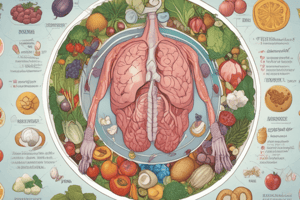Podcast
Questions and Answers
What is the primary function of carbohydrates in the body?
What is the primary function of carbohydrates in the body?
- To provide energy for the body (correct)
- To regulate body temperature
- To build and repair tissues
- To aid in the digestion of food
Which type of fat is typically liquid at room temperature?
Which type of fat is typically liquid at room temperature?
- Trans fat
- Unsaturated (correct)
- Hydrogenated fat
- Saturated
What is the primary function of protein in the body?
What is the primary function of protein in the body?
- To provide energy for the body
- To regulate body temperature
- To build and repair tissues (correct)
- To aid in the digestion of food
What is the recommended percentage of the plate that should be dedicated to fruits and vegetables according to MyPlate?
What is the recommended percentage of the plate that should be dedicated to fruits and vegetables according to MyPlate?
What is the term for a deficiency or excess of nutrients?
What is the term for a deficiency or excess of nutrients?
What is the primary way to prevent foodborne illness?
What is the primary way to prevent foodborne illness?
What is the term for the established recommended daily intake of nutrients?
What is the term for the established recommended daily intake of nutrients?
What is the term for the inorganic elements essential for various bodily functions?
What is the term for the inorganic elements essential for various bodily functions?
Flashcards are hidden until you start studying
Study Notes
Macronutrients
- Carbohydrates: Provide energy for the body, found in grains, fruits, and vegetables
- Types: simple (sugars), complex (starches, fibers)
- Protein: Build and repair tissues, found in animal products, legumes, and nuts
- Essential amino acids: cannot be produced by the body, must be obtained through diet
- Fats: Provide energy, found in animal products, oils, and nuts
- Types: saturated (solid at room temperature), unsaturated (liquid at room temperature)
Micronutrients
- Vitamins: Organic compounds essential for various bodily functions
- Fat-soluble: A, D, E, K
- Water-soluble: B, C
- Minerals: Inorganic elements essential for various bodily functions
- Macrominerals: calcium, phosphorus, magnesium, potassium, sodium, chloride
- Microminerals: iron, zinc, iodine, selenium, copper, manganese
Nutrition Recommendations
- Dietary Reference Intake (DRI): Established by the National Academy of Sciences to provide recommended daily intake of nutrients
- MyPlate: A food guide developed by the US Department of Agriculture, recommends:
- 50% of plate: fruits and vegetables
- 30% of plate: grains
- 20% of plate: protein and dairy
Nutrition-Related Health Conditions
- Malnutrition: Deficiency or excess of nutrients, can lead to health problems
- Obesity: Excess body fat, increases risk of chronic diseases
- Diabetes: High blood sugar levels, can be managed through diet and exercise
- Heart disease: High intake of saturated fats, sodium, and cholesterol increases risk
Food Safety and Handling
- Foodborne illness: Caused by consuming contaminated food, can be prevented by:
- Proper handwashing
- Separating raw and cooked foods
- Cooking to recommended temperatures
- Refrigerating perishable foods promptly
Macronutrients
- Carbohydrates are the body's primary source of energy, found in grains, fruits, and vegetables, and come in two types: simple (sugars) and complex (starches, fibers).
- Protein is essential for building and repairing tissues, found in animal products, legumes, and nuts, and consists of essential amino acids that cannot be produced by the body and must be obtained through diet.
- Fats provide energy, found in animal products, oils, and nuts, and come in two types: saturated (solid at room temperature) and unsaturated (liquid at room temperature).
Micronutrients
- Vitamins are organic compounds essential for various bodily functions, and come in two types: fat-soluble (A, D, E, K) and water-soluble (B, C).
- Minerals are inorganic elements essential for various bodily functions, and come in two categories: macrominerals (calcium, phosphorus, magnesium, potassium, sodium, chloride) and microminerals (iron, zinc, iodine, selenium, copper, manganese).
Nutrition Recommendations
- The Dietary Reference Intake (DRI) establishes recommended daily intake of nutrients, as set by the National Academy of Sciences.
- The MyPlate food guide recommends filling 50% of the plate with fruits and vegetables, 30% with grains, and 20% with protein and dairy.
Nutrition-Related Health Conditions
- Malnutrition occurs when there is a deficiency or excess of nutrients, and can lead to health problems.
- Obesity is a condition characterized by excess body fat, increasing the risk of chronic diseases.
- Diabetes is a condition characterized by high blood sugar levels, and can be managed through diet and exercise.
- Heart disease is a condition characterized by high intake of saturated fats, sodium, and cholesterol, increasing the risk.
Food Safety and Handling
- Foodborne illness is caused by consuming contaminated food, and can be prevented by proper handwashing, separating raw and cooked foods, cooking to recommended temperatures, and refrigerating perishable foods promptly.
Studying That Suits You
Use AI to generate personalized quizzes and flashcards to suit your learning preferences.




